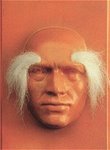
Welcome to the second week of Poker Unclogged, our new column that brings you obscure facts and features about the game that drives us wild.
We start with a children’s joke:
Q: Why did the bumblebees go on strike?
A: Because they wanted shorter flowers and more honey.
During the California Gold Rush of the mid-nineteenth century, there were those who wanted their share of the pot. They didn’t want the long hours and the dirty hands that were consequences of panning. Some say they were concerned about environmental damage, others argue they were bone idle.
Whatever.
These individuals soon found themselves in San Francisco’s saloons. We are sure any student of human behaviour will be stunned to learn that these places of ill repute, flushed with new money, soon began to offer liquor, women and games of chance. We know, we know - it’s truly shocking, but they were heady days, ok?
Instant wealth was everywhere. Gone was the time when people would accumulate a little bit, year after year. They wanted it now, gawd-dammit, and if they couldn’t get it through panning for gold, they could always play poker. Players sharpened their game and it wasn’t long before there was a demand for private, high-stakes poker rooms and fortunes started changing hands.
The Cinch Room in the Palace Hotel quickly became one of the most alluring, presumably because it was ‘richly equipped with innumerable brass spittoons’ and it welcomed players with high expectorations: the richest spitters in town played for probably the highest stakes in poker’s history. Pots regularly topped $100,000 and ones of $50,000 were very common – today, those amounts would equate to several million dollars.
Notable players included:
James C Flood – not only did he make a fortune investing on the basis of advice of punters in a saloon he owned, he also made $1m dollars playing poker, which enabled him to form Nevada Bank, which later became Wells Fargo.
Senator James Graham Fair – ‘Slippery Jim’ – One of the founders of the ‘Bonanza Firm’, he was a habitual adulterer who was not invited to his daughter’s wedding. However, he was obviously not bitter as he managed to leave his family $40m in trust funds when he died, an amount boosted by his poker skills.
Senator William Sharon – A member of the Republican party, famous for a judicial ruling that after his death caused a knife fight in the courthouse, his poker skills earned him $1m dollars.
Whilst many people left California with little more than they arrived with, there were others who, without getting their hands dirty, amassed personal fortunes and greatly influenced the direction of its cities: a fair proportion were talented poker players who worked short hours and knew when to strike.
We start with a children’s joke:
Q: Why did the bumblebees go on strike?
A: Because they wanted shorter flowers and more honey.
During the California Gold Rush of the mid-nineteenth century, there were those who wanted their share of the pot. They didn’t want the long hours and the dirty hands that were consequences of panning. Some say they were concerned about environmental damage, others argue they were bone idle.
Whatever.
These individuals soon found themselves in San Francisco’s saloons. We are sure any student of human behaviour will be stunned to learn that these places of ill repute, flushed with new money, soon began to offer liquor, women and games of chance. We know, we know - it’s truly shocking, but they were heady days, ok?
Instant wealth was everywhere. Gone was the time when people would accumulate a little bit, year after year. They wanted it now, gawd-dammit, and if they couldn’t get it through panning for gold, they could always play poker. Players sharpened their game and it wasn’t long before there was a demand for private, high-stakes poker rooms and fortunes started changing hands.
The Cinch Room in the Palace Hotel quickly became one of the most alluring, presumably because it was ‘richly equipped with innumerable brass spittoons’ and it welcomed players with high expectorations: the richest spitters in town played for probably the highest stakes in poker’s history. Pots regularly topped $100,000 and ones of $50,000 were very common – today, those amounts would equate to several million dollars.
Notable players included:
James C Flood – not only did he make a fortune investing on the basis of advice of punters in a saloon he owned, he also made $1m dollars playing poker, which enabled him to form Nevada Bank, which later became Wells Fargo.
Senator James Graham Fair – ‘Slippery Jim’ – One of the founders of the ‘Bonanza Firm’, he was a habitual adulterer who was not invited to his daughter’s wedding. However, he was obviously not bitter as he managed to leave his family $40m in trust funds when he died, an amount boosted by his poker skills.
Senator William Sharon – A member of the Republican party, famous for a judicial ruling that after his death caused a knife fight in the courthouse, his poker skills earned him $1m dollars.
Whilst many people left California with little more than they arrived with, there were others who, without getting their hands dirty, amassed personal fortunes and greatly influenced the direction of its cities: a fair proportion were talented poker players who worked short hours and knew when to strike.


No comments:
Post a Comment